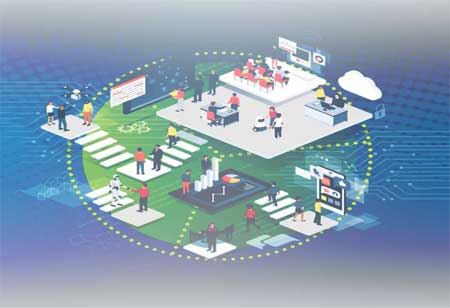THANK YOU FOR SUBSCRIBING
How Artificial Intelligence is Transforming the Future of Manufacturing
Artificial Intelligence (AI) has emerged as a groundbreaking force, significantly altering industries worldwide

By
Apac CIOOutlook | Wednesday, January 03, 2024
Stay ahead of the industry with exclusive feature stories on the top companies, expert insights and the latest news delivered straight to your inbox. Subscribe today.
AI transforms manufacturing with smart factories, predictive maintenance, design optimization, and sustainability. AI offers an overwhelmingly positive impact, making the industry more efficient, sustainable, and adaptable.
FREMONT, CA: Artificial Intelligence (AI) has emerged as a groundbreaking force, significantly altering industries worldwide. One sector profoundly impacted by this shift is manufacturing, where AI has revolutionized the way products are designed, produced, and delivered.
Smart Factories
AI's influence on manufacturing revolves around smart factories—facilities leveraging advanced technologies, including AI, to streamline operations and base decisions on data. These smart factories integrate AI to achieve unparalleled automation and efficiency. By interconnecting systems and employing intelligent machines, these facilities optimize production processes, maximizing output while minimizing waste.
Predictive Maintenance
One of manufacturing's significant challenges has been the unpredictability of machinery breakdowns, resulting in costly downtime and maintenance expenses. AI has transformed this aspect by introducing predictive maintenance. Using data from sensors and historical performance, AI algorithms predict potential machine failures, allowing proactive maintenance. This reduces downtime, prolongs equipment lifespan, and leads to substantial cost savings for manufacturers.
Enhanced Productivity through Automation
AI's most immediate impact in manufacturing is witnessed through automation. AI-powered robots and machines handle repetitive and labor-intensive tasks across assembly lines and quality control, freeing human workers for more complex and creative roles. This shift towards automation significantly boosts productivity, ensuring higher precision and consistency in manufacturing processes.
Design Optimization with Generative Design
AI is reshaping product design through generative design, where AI algorithms consider parameters like materials, budget constraints, and performance criteria to generate multiple design options meeting these criteria. This iterative process enables the creation of optimized designs beyond human conception, resulting in lighter, stronger, and more efficient products.
Supply Chain Optimization
Traditionally, supply chains react to disruptions as they occur. AI introduces a paradigm shift by enabling proactive supply chain management. Machine learning algorithms analyze vast data to predict demand, identify potential disruptions, and optimize inventory levels. This creates a more agile and resilient supply chain, reducing lead times and ensuring a consistent flow of materials.
Quality Control
Maintaining product quality is crucial, and AI is revolutionizing quality control with advanced inspection systems capable of detecting even the smallest defects. AI-driven machine vision empowers cameras and sensors to scrutinize products with unparalleled precision, significantly reducing the chances of defective products reaching consumers. AI integration improves the efficiency of quality control processes, ensuring a higher standard of production.
AI-powered Decision Support Systems
Manufacturing involves numerous decisions, and AI-powered decision support systems analyze data from various sources to provide real-time insights, empowering decision-makers to optimize resource allocation and adapt to changing market conditions effectively.
Human-Machine Collaboration
Contrary to fears of AI replacing human workers, it fosters collaboration between humans and machines. AI handles repetitive tasks, allowing humans to focus on tasks requiring creativity, problem-solving, and emotional intelligence, resulting in a more skilled and adaptable workforce.
Environmental Sustainability
The integration of AI in manufacturing not only boosts efficiency but also contributes to environmental sustainability. AI-driven optimization processes minimize energy consumption, waste, and emissions, aligning with global efforts for eco-friendly manufacturing practices.
Security and Workforce Reskilling
Despite its transformative potential, widespread AI adoption in manufacturing raises cybersecurity concerns due to interconnected systems. Manufacturers must invest in robust cybersecurity measures to protect sensitive data. Additionally, the integration of AI necessitates significant workforce reskilling efforts.
The future of manufacturing is undergoing a profound transformation, driven by AI integration. As manufacturers embrace AI's opportunities, the industry is poised to become more efficient, sustainable, and adaptable than ever before. The journey towards a fully AI-powered manufacturing landscape promises a more advanced, interconnected, and intelligent future.





